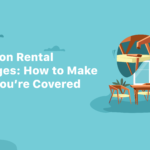With coronavirus (COVID-19) in the news, many travelers are concerned about protecting their health. While some of the fears are overblown, travelers are cancelling their travel plans at record rates – and there are things you can do as a manager to reassure them.
It’s our job as professionals to have standards for cleanliness in place for every stay. That said, there are certainly some extra precautions you can take during a health scare like COVID-19.
When we communicate with our guests about the precautions we’ve taken to protect them, we can restore their peace of mind as they travel. You want your guests to feel confident that when they stay in one of your properties, they don’t have anything to worry about.
Here’s how to make that happen.
How Worried Should You Be?
COVID-19 is the latest in a string of coronaviruses for which we have no immediate vaccine. One of the reasons people are especially worried is that it has a relatively high fatality rate (best estimate reported by the World Health Organization is 2.1% as of this writing).
While most people are unlikely to be infected and the fatality risk is low for those whose immune systems are uncompromised, it’s still a frightening prospect for many.
And let’s face it: even for those who are healthy and low risk, contracting COVID-19 is reported to be like having a particularly nasty bout of pneumonia. No one wants to spend a month in bed if they can possibly avoid it!
Travelers are at higher risk for infection because they travel through high-trafficked areas like airports and conferences. While there’s no need to panic, realizing that travelers pose a slightly higher risk is a great reason to take a few extra steps to keep your cleaners, your guests, and yourself safe from potential infection.
What Protection Do Your Cleaners Need?
First things first: let’s make sure your cleaners stay healthy as they clean your properties. They’re going to be the first ones to access the property after the last guest’s stay, so you want to make sure they’re safe from infection.
Make sure to read the information by recognized health organizations such as WHO. You’ll want to understand how the disease is spread so that you can effectively protect your cleaners and your guests.
For COVID-19, we’re dealing with an enveloped virus, which means it can be disrupted simply through the application of soap, water, and agitation. That means lots of handwashing! Here’s how to wash hands correctly.
UPDATE ON MASKS: Previously, this article cited the WHO and CDC recommendation that masks were not necessary. That recommendation has since been updated by those organizations to reflect new studies that suggest the virus can be transmitted by those who are asymptomatic. While your cleaner is still not likely to encounter live virus at the rental, since it can only linger in the air at most for 3 hours under optimal conditions, your cleaner themselves may be an asymptomatic carrier, and could possibly infect the rental themselves without face protection.
We are now recommending that cleaners wear cloth or disposable masks to protect against the possibility that they are contagious but not experiencing symptoms. We still do not recommend the use of N95 or other medical-grade masks, as they are desperately needed by medical personnel currently, and are designed to protect against person-to-person transmission, which your cleaner will not be encountering at the property as they clean.
There is no definitive data on how long the new coronavirus can survive on surfaces. Based on other coronaviruses we’ve seen before, COVID-19 may be able to survive on surfaces for up to two days at room temperature, which means your cleaners should be sure to avoid touching any uncleaned surfaces and afterward touching their face.
Proactively reach out to your cleaners and let them know how the virus is spread and how they can protect themselves.
Sharing information and helping your cleaners take the right precautions will let them know you are proactively protecting their wellbeing.
How Should Your Cleaners Change Their Process?
Your cleaners are likely already cleaning all surfaces in the rental, so their cleaning process does not need to change dramatically. However, there are a few modifications they should make to their process to ensure that a previous guest does not infect a future guest.
Make sure your cleaners are using an approved disinfecting cleanser. Not all cleansers disinfect, and when you’re dealing with infection, you want to be sure you’ve eradicated it from all surfaces.
- Wipe down light switches, lamps, cupboard handles, doorknobs, banisters, remotes, and thermostats. These are tiny areas of the property that don’t normally require attention, but since it is extremely likely that your previous guest touched these points, it is important to wipe them down. Make sure your cleaners know to give these areas special attention.
- Run all of your dishes and flatware through the dishwasher – even the clean ones. Think about the way you get a plate out of the cupboard. Your fingers touch the plate stacked beneath the one you removed, right? If that plate is infected and your guest eats a meal off of it, they will likely get infected as well. Play it safe and wash every dish.
- Sanitize high-contamination sites. Hopefully, your cleaner is already doing this, but just in case sanitization hasn’t been on your radar so far, make sure to use a disinfectant spray or bleach on your bathroom toilet, sink, and trash can. You should also disinfect your toilet brush!
- Wipe down all appliances, electronics, and provided amenities. Do you have an iron for your guests? A vacuum cleaner? Ask your cleaner to wipe down all of these items in case the previous guest left them infected. If you have soap dispensers, sponges, or other items for guest use, make sure they are clean and/or new.
- Run all available linens through the laundry – even the clean ones. If there’s a clean dish towel in the drawer that the previous guest didn’t use, it may still be infected for the same reason that the dishes may be – the guest may have touched it without using it. Play it safe and run all your linens through the wash.
- Clean your cleaning items. Do you provide soap, dishwasher liquid, laundry detergent, or cleaning supplies to your guests? These items often live under the sink and don’t get a lot of attention – they’re cleaning supplies, after all. However, bacteria can still live on the surfaces, and they need a good wipe-down in case of infection.
- Just before your cleaner leaves the property, have them sterilize your entry method. This might be the keypad or a set of keys in a lockbox, but either way, make sure the entry method has been thoroughly cleaned.
You’re asking your cleaner to take extra time to attend to more minute details, so make sure to compensate them accordingly and adjust your expectations for how long a job will take.
Your priority should be safety, not efficiency. You want your cleaner to be thoughtful about what might need to be sanitized at the property. Make sure they understand that you’re counting on them to prevent infection – and that you value their work.
What Should You Tell Your Guests?
Proactively reach out to your guests with reassurance and information. Communication and trust are key during any health scare, and you want to make sure they know that you are aware of the risks in traveling and that you have taken steps to ensure their wellbeing.
- Give your guests the information you have gathered from recognized health sources. Not all of your guests will have consulted health organizations – they may have gotten their information from the news or from well-meaning friends and relatives. This means they may be exaggerating the risk and more worried than they need to be.
- Explain what additional precautions you have taken to protect their health. Let them know that you’ve added steps to your cleaning process to make sure they are protected from the spread of infection. This lets them know you’re proactive and that you have double-checked your process for any risk to their health.
- Ask if there is anything else you can do to make them feel comfortable. This gives your guest the opportunity to tell you if there’s anything they’re particularly concerned about that you may be able to address.
Some of your guests may still be too worried about infection to travel, but with the steps above, you can be certain you’ve done your best to alleviate their fears and ensure trust in your properties. They may be too worried to fly, but they will feel confident that they won’t catch any kind of bug – severe or otherwise – in your rental.
During this difficult time, Properly is creating free resources to help property managers protect and inform themselves, their guests, their owners, and their service providers. You can find all of those resources here at Everything Property Managers Need to Know About COVID-19.
You can also sign up for our newsletter Properly Informed to get new resources delivered directly to your inbox.




